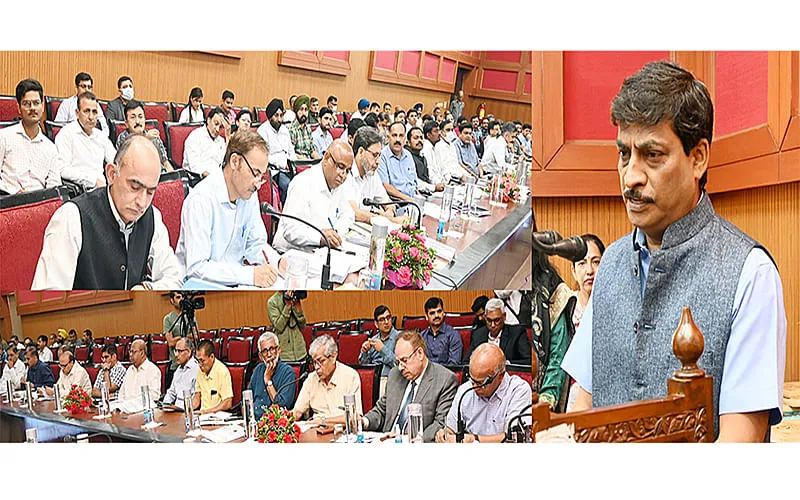Jammu, Apr 25: Chief Secretary, Dr Arun Kumar Mehta today expressed confidence that India is more than capable of achieving its goal of net zero carbon emissions by 2070 and said that it is high time that “we shifted away from fossil fuels and made alternate sources our main energy providers.”
He was speaking at a workshop organised by the Jammu & Kashmir Pollution Control Committee here at the Convention Centre.
The interactive workshop ‘Climate Change Mitigation and Green Financing for a Climate Resilient and Carbon Neutral J&K’ was attended by Dr.Mohit Gera, PCCF (HoFF), J&K Forest Department and Chairman, J&K Pollution Control Committee; Dr. Shakil Ahmad Romshoo, Vice Chancellor, Islamic University, Kashmir; HoDs of Forest Department, Dr. Ravindranath, renowned IPCC Author, and resource persons from MoEFCC, TERI, Earnest and Young Climate, World Resources Institute of India besides other eminent guests and environment experts.
Dr. Mehta appreciated the efforts of the Pollution Control Committee and Jammu and Kashmir Forest Department for organizing deliberations on Net Zero Carbon by 2070. He informed that J&K has already made a model by developing a climate-resilient and carbon neutral Panchayat of village Palliin District Samba which is first of its kind in the country.
According to Dr Mehta, Jammu & Kashmir has always been at the forefront of adopting flagship developmental schemes of the government. ‘The distinction of implementing the 75 Amrit Sarovars in each district amongst the first in the entire country is a good example of how well J&K can adapt to the needs of the times with cooperation from its citizens. Similarly, schemes like “Har Gaon Hariyali”, “One Beat Guard, One village Program”, “Van Se Jal, Jal Se Jeevan” have been very effective in building resilience and adaptation at village level.
J&K has been a leader in adopting transformative steps in the overhaul of sports, agriculture, and tourism sectors in recent years. The Chief Secretary stated that “we are planting more trees every year than ever before and this year over one and half crore trees are going to be planted again all over J&K.”
The Chief Secretary stressed the importance of communicating climate change adaptation measures to the masses in a way that creates a genuine connection with them. To achieve this goal, the Chief Secretary emphasized the need to communicate with the public at all levels, including panchayats, in ways that creates public ownership.
Dr Mohit Gera, PCCF (HoFF) and Chairman, J&K Pollution Control Committee spoke in detail on purpose of workshop, likely strategies and action plan for building resilience in Union Territory in view of vulnerability of Jammu and Kashmir.
Prof. N.H Ravindranath, Indian Institute of Science, Bengaluru made introductory remarks on the topic “India’s Policies and Commitments” and Dr. Shakil Ahmad Romshoo, Vice chancellor, Islamic University of Science and Technology, Awantipora, Kashmir highlighted the likely impacts of climate change and vulnerability of J&K.







